2016年英语高考真题
2016年高考英语全国1卷(附答案)
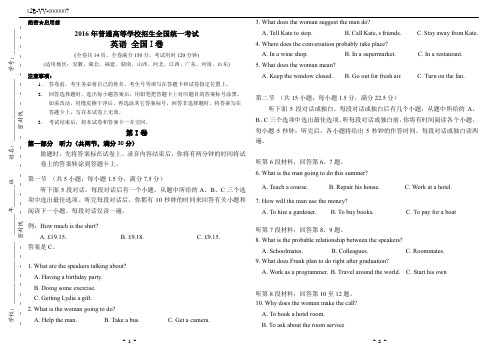
学校:____________________ _______年_______班 姓名:____________________ 学号:________- - - - - - - - - 密封线 - - - - - - - - - 密封线 - - - - - - - - -绝密★启用前2016年普通高等学校招生全国统一考试英语 全国I 卷(全卷共14页,全卷满分150分,考试用时120分钟)(适用地区:安徽、湖北、福建、湖南、山西、河北、江西、广东、河南、山东) 注意事项:1.答卷前,考生务必将自己的姓名、考生号等填写在答题卡和试卷指定位置上。
2. 回答选择题时,选出每小题答案后,用铅笔把答题卡上对应题目的答案标号涂黑。
如需改动,用橡皮擦干净后,再选涂其它答案标号,回答非选择题时,将答案写在答题卡上,写在本试卷上无效。
3.考试结束后,将本试卷和答案卡一并交回。
第I 卷第一部分 听力(共两节,满分30分)做题时,先将答案标在试卷上。
录音内容结束后,你将有两分钟的时间将试卷上的答案转涂到答题卡上。
第一节 (共5小题;每小题1.5分,满分7.5分)听下面5段对话。
每段对话后有一个小题,从题中所给的A 、B 、C 三个选项中选出最佳选项。
听完每段对话后,你都有10秒钟的时间来回答有关小题和阅读下一小题。
每段对话仅读一遍。
例:How much is the shirt?A. £19.15.B. £9.18.C. £9.15.答案是C 。
1. What are the speakers talking about? A. Having a birthday party. B. Doing some exercise. C. Getting Lydia a gift.2. What is the woman going to do? A. Help the man. B. Take a bus.C. Get a camera.3. What does the woman suggest the man do?A. Tell Kate to stop.B. Call Kate, s friends.C. Stay away from Kate. 4. Where does the conversation probably take place?A. In a wine shop.B. In a supermarket.C. In a restaurant. 5. What does the woman mean? A. Keep the window closed. B. Go out for fresh air. C. Turn on the fan.第二节 (共15小题;每小题1.5分,满分22.5分)听下面5段对话或独白。
2016年全国Ⅰ卷高考英语试题附答案.pdf

2016年全国Ⅰ卷高考英语试题第一部分阅读理解(共两节,满分40分)AYou probably know who Marie Curie was, but you may not have heard of Rachel Carson. Of the outstanding ladies listed below, who do you think was the most important woman of the past 100 years?Jane Addams(1860-1935)Anyone who has ever been helped by a social worker has Jane Addams to thank Addans helpedthe poor and worked for peace. She encouraged a sense of community(社区)by creating shelters and promoting education and services for people in need In 1931,Addams became the first American woman to win the Nobel Peace Prize.Rachel Carson(1907-1964)If it weren’t for Rachel Carson, the environmental movement might not exist today. Her popular 1962 book Silent Spring raised awareness of the dangers of pollution and the harmful effects of chemicals on humans and on the world’s lakes and oceans.Sandra Day O’Connor(1930-present)When Sandra Day O’Connor finished third in her class at Stanford Law School, in 1952, she couldnot find work at a law firm because she was a woman. She became an Arizona state senator(参议员) and ,in 1981, the first woman to join the U.S. Supreme Court. O’Connor gave the deciding vote in many important cases during her 24 years on the top court.Rosa Parks (1913-2005)On December 1,1955, in Montgomery, Alabama, Rosa Parks would not give up her seat on a busto a white passenger. Her simple act landed Parks in prison. But it also set off the Montgomery busboycott. It lasted for more than a year, and kicked off the civil-rights movement. “The only tired I was, was tired of giving in,” said Parks.21. What is Jane Addams noted for in history?A. Her social work.B. Her teaching skills.C. Her efforts to win a prize.D. Her community background.。
2016年高考全国3卷英语试题(含答案)

2016年高考全国3卷英语试题(含答案)DA. It’s sunny.B. It’s rainy.C. It’s cloudy.3. Why does the man talk to Dr. Simpson?A. To make an apology.B. To ask for help.C. To discuss his studies.4. How will the woman get back from the railway station?A. By train.B. By car.C. By bus.5. What does Jenny decide to do first?A. Look for a job.B. Go on a trip.C. Get an assistant.第二节(共15小题;每小题1.5分,满分22.5分)听下面5段对话或独白。
每段对话或独白后有几个小题,从题中所给的A、B、C三个选项中选出最佳选项,并标在试卷的相应位置。
听每段对话或独白前,你将有时间阅读各个小题,每小题5秒钟;听完后,各小题将给出5秒钟的作答时间。
每段对话或独白读两遍。
听第6段材料,回答第6、7题。
6. What time is it now?A. 1:45.B. 2:10.C. 2:15.7. What will the man do?A. Work on a project.B. See Linda in the library.C. Meet with Professor Smith.听第7段材料,回答第8至10题。
8. What are the speakers talking about?A Having guests this weekend.B. Going out for sightseeing.C. Moving into a new house.9. What is the relationship between the speakers?A. Neighbors.B. Husband and wife.C. Host and visitor.10. What will the man do tomorrow?A. Work in his garden.B. Have a barbecue.C. Do some shopping.听第8段材料,回答第11至13题。
2016高考英语试题(新课标I)-全国卷1(乙卷)-参考答案
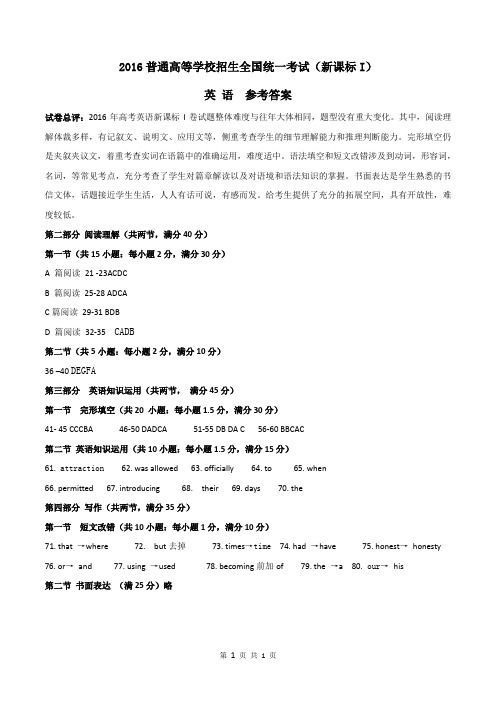
2016普通高等学校招生全国统一考试(新课标I)英语参考答案试卷总评:2016年高考英语新课标I卷试题整体难度与往年大体相同,题型没有重大变化。
其中,阅读理解体裁多样,有记叙文、说明文、应用文等,侧重考查学生的细节理解能力和推理判断能力。
完形填空仍是夹叙夹议文,着重考查实词在语篇中的准确运用,难度适中。
语法填空和短文改错涉及到动词,形容词,名词,等常见考点,充分考查了学生对篇章解读以及对语境和语法知识的掌握。
书面表达是学生熟悉的书信文体,话题接近学生生活,人人有话可说,有感而发。
给考生提供了充分的拓展空间,具有开放性,难度较低。
第二部分阅读理解(共两节,满分40分)第一节(共15小题:每小题2分,满分30分)A 篇阅读21 -23ACDCB 篇阅读25-28 ADCAC篇阅读29-31 BDBD 篇阅读32-35 CADB第二节(共5小题:每小题2分,满分10分)36 –40 DEGFA第三部分英语知识运用(共两节,满分45分)第一节完形填空(共20 小题:每小题1.5分,满分30分)41- 45 CCCBA 46-50 DADCA 51-55 DB DA C 56-60 BBCAC第二节英语知识运用(共10小题:每小题1.5分,满分15分)61. attraction62. was allowed 63. officially 64. to 65. when66. permitted 67. introducing 68. their 69. days 70. the第四部分写作(共两节,满分35分)第一节短文改错(共10小题:每小题1分,满分10分)71. that →where 72. but去掉73. times→time74. had →have 75. honest→honesty 76. or→and 77. using →used 78. becoming前加of 79. the →a 80. our→his第二节书面表达(满25分)略第1页共1 页。
2016年全国高考英语试题与答案_全国卷1.docx
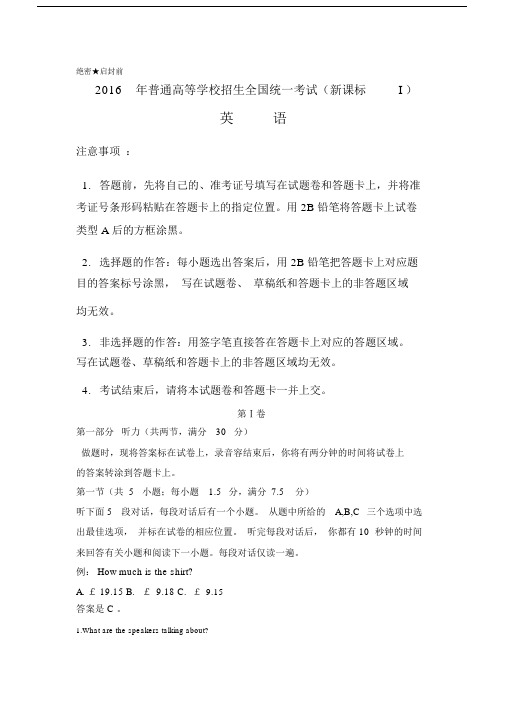
绝密★启封前2016 年普通高等学校招生全国统一考试(新课标I )英语注意事项:1.答题前,先将自己的、准考证号填写在试题卷和答题卡上,并将准考证号条形码粘贴在答题卡上的指定位置。
用 2B 铅笔将答题卡上试卷类型 A 后的方框涂黑。
2.选择题的作答:每小题选出答案后,用 2B 铅笔把答题卡上对应题目的答案标号涂黑,写在试题卷、草稿纸和答题卡上的非答题区域均无效。
3.非选择题的作答:用签字笔直接答在答题卡上对应的答题区域。
写在试题卷、草稿纸和答题卡上的非答题区域均无效。
4.考试结束后,请将本试题卷和答题卡一并上交。
第Ⅰ卷第一部分听力(共两节,满分30分)做题时,现将答案标在试卷上,录音容结束后,你将有两分钟的时间将试卷上的答案转涂到答题卡上。
第一节(共 5小题;每小题 1.5分,满分7.5分)听下面 5段对话,每段对话后有一个小题。
从题中所给的A,B,C三个选项中选出最佳选项,并标在试卷的相应位置。
听完每段对话后,你都有 10 秒钟的时间来回答有关小题和阅读下一小题。
每段对话仅读一遍。
例: How much is the shirt?A. £ 19.15B.£9.18C.£9.15答案是 C 。
1.What are the speakers talking about?A. Having a birthday party.B. Doing some exercise.C. Getting Lydia a gift2.What is the woman going to do?A. Help the man.B. Take a bus.C.Get a camera3.What does the woman suggest the man do?A. Tell Kate to stop.B. Call Kate,s friends.C. Stay away from Kate.4.Where does the conversation probably take place?A. In a wine shop.B. In a supermarket.5.What does the woman mean?A. Keep the window closed.B. Go out for fresh air.C. Turn on the fan.听第 6 段材料,回答第6、 7 题。
2016高考英语全国卷一卷 英语(含答案解析)
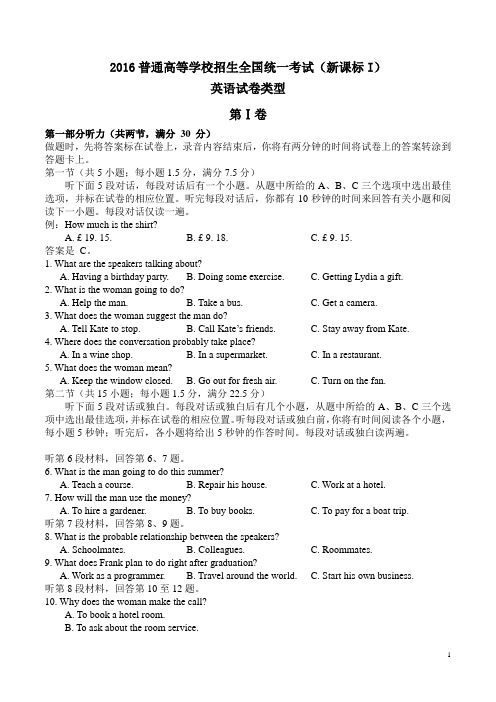
2016普通高等学校招生全国统一考试(新课标I)英语试卷类型第Ⅰ卷第一部分听力(共两节,满分30 分)做题时,先将答案标在试卷上,录音内容结束后,你将有两分钟的时间将试卷上的答案转涂到答题卡上。
第一节(共5小题;每小题1.5分,满分7.5分)听下面5段对话,每段对话后有一个小题。
从题中所给的A、B、C三个选项中选出最佳选项,并标在试卷的相应位置。
听完每段对话后,你都有10秒钟的时间来回答有关小题和阅读下一小题。
每段对话仅读一遍。
例:How much is the shirt?A. £ 19. 15.B. £ 9. 18.C. £ 9. 15.答案是C。
1. What are the speakers talking about?A. Having a birthday party.B. Doing some exercise.C. Getting Lydia a gift.2. What is the woman going to do?A. Help the man.B. Take a bus.C. Get a camera.3. What does the woman suggest the man do?A. Tell Kate to stop.B. Call Kate’s friends.C. Stay away from Kate.4. Where does the conversation probably take place?A. In a wine shop.B. In a supermarket.C. In a restaurant.5. What does the woman mean?A. Keep the window closed.B. Go out for fresh air.C. Turn on the fan.第二节(共15小题;每小题1.5分,满分22.5分)听下面5段对话或独白。
英语高考试题全国卷含答案

英语高考试题全国卷含答案英语高考试题全国卷含答案文档编制序号:[KK8UY-LL9IO69-TTO6M3-MTOL89-FTT688]绝密★启用前 6月8日15:00—16:402016年普通高等学校全国统一考试(新课标全国卷III)英语注意事项:本试卷分第I卷(选择题)和第II卷(非选择题)两部分。
考试结束后.将本试卷和答题卡一并交回。
第I卷注意事项:1.答第I卷前,考考生务必将自己的姓名、考生号填写在答题卡上。
2.选出每小题答案后,用铅笔把答题卡上对应的题目的答案标号涂黑。
如需改动,用橡皮擦干净后,在选涂其他答案标号。
不能答在本试卷,否则无效。
第一部分阅读理解(共两节,满分40分)第一节(共15小题;每小题2分,满分30分)阅读下列短文,从每题所给的四个选项(A、B、C和D)中,选出最佳选项,并在答题卡上将该项涂黑。
AMusicOpera at Music Hall: 1243 Elm Street. The season runs June through August, with additional performances in March and September. The Opera honors Enjoy the Arts membership discounts. Phone: 241-2742. .Chamber Orchestra: The Orchestra plays at Memorial Hall at 1406 Elm Street, which offers several concerts from March through June. Call 723-1182 for more information. http: .Symphony Orchestra: At Music Hall and Riverbend. For ticket sales, call381-3300. Regular season runs September through May at Music Hall in summer at Riverbend. .College Conservatory of Music (CCM): Performances are on the maincampus(校园) of the university, usually at Patricia Cobbett Theater. CCM organizes a variety of events, including performances by the well-known LaSalle Quartet, CCM’s Philharmonic Orchestra, and various groups of musicians presenting Baroque through modern music. Students with I.D. cards can attend the events for free. A free schedule of events for each term is available by calling the box office at 556-4183. .Riverbend Music Theater: 6295 Kellogg Ave. Large outdoor theater with the closest seats under cover (price difference).Big name shows all summer long! Phone:232-6220. .1. Which number should you call if you want to see an operaA. 241-2742.B. 723-1182.C. 381-3300.D. 232-6220.2. When can you go to a concert by Chamber OrchestraA. February.B. May.C. August.D. November.3.Where can students go for free performances with their I.D. cardsA. Music Hall.B. Memorial Hall.C. Patricia Cobbett Theater.D. Riverbend Music Theater.4. How is Riverbend Music Theater different from the other placesA. It has seats in the open air.B. It gives shows all year round.C. It offers membership discounts.D. It presents famous musical works.BOn one of her trips to New York several years ago, Eudora Welty decided to take a couple of New York friends out to dinner. They settled in at a comfortable East Side cafe and within minutes, another customer was approaching their table.“Hey, aren’t you from Mississippi” the elegant, white-haired writer remembered being asked by the stranger. “I’m from Mississippi too.”Without a second thought, the woman joined the Welty party. When her dinner partner showed up, she also pulled up a chair.“They began telling me all the news of Mississippi,” Welty said. “I didn’t know what my New York friends were thinking.”Taxis on a rainy New York night are rarer than sunshine. By the time the group got up to leave, it was pouring outside. Welty’s new friends immediately sent a waiter to find a cab. Heading back downtown toward herhotel, her big-city friends were amazed at the turn of events that had changed their Big Apple dinner into a Mississippi.“My friends said: ‘Now we believe your stories,’” Welty added.“And I said: ‘Now you know. These are the people that make me write them.’”Sitting on a sofa in her room, Welty, a slim figure in a simple gray dress, looked pleased with this explanation.“I don’t make them up,” she said of the characters in her fiction these last 50 or so years. “I don’t have to.”Beauticians, bartenders, piano players and people with purple hats, Welty’s people come from afternoons spent visiting with old friends, from walks through the streets of her native Jackson, Miss., from conversations overheard on a bus. It annoys Welty that, at 78, her left ear has now given out. Sometimes, sitting on a bus or a train, she hears only a fragment(片段) of a particularly interesting story.5. What happened when Welty was with her friends at the cafeA. Two strangers joined her.B. Her childhood friends came in.C. A heavy rain ruined the dinner.D. Some people held a party there.6. The underlined word “them” in Paragraph 6 refers to Welty’s .A. readersB. partiesC. friendsD. stories7. What can we learn about the characters in Welty’s fictionA. They live in big cities.B. They are mostly women.C. They come from real life.D. They are pleasure seekers.CIf you are a fruit grower—or would like to become one—takeadvantage of Apple Day to see what’s around. It’s called Apple Day but in practice it’s more like Apple Month. The day itself is on October 21, but since it has caught on, events now spread out over most of October around Britain.Visiting an apple event is a good chance to see, and often taste, awide variety of apples. To people who are used to the limited choice of apples such as Golden Delicious and Royal Gala in supermarkets, it can be quite an eye opener to see the range of classical apples still in existence, such as Decio which was grown by the Romans. Although it doesn’t taste of anything special, it’s still wo rth a try, as is the knobbly(多疙瘩的)Cat’s Head which is more of a curiosity than anything else.There are also varieties developed to suit specific local conditions. One of the very best varieties for eating quality is Orleans Reinette, but you’ll need a wa rm, sheltered place with perfect soil to grow it, so it’s a pipe dream for most apple lovers who fall for it.At the events, you can meet expert growers and discuss which ones will best suit your conditions, and because these are family affairs, children are well catered for with apple-themed fun and games.Apple Days are being held at all sorts of places with an interest in fruit, including stately gardens and commercial orchards(果园).If you want to have a real orchard experience, try visiting the National Fruit Collection at Brogdale, near Faversham in Kent.8.What can people do at the apple eventsA. Attend experts’ lectures.B. Visit fruit-loving families.C. Plant fruit trees in an orchard.D. Taste many kinds of apples.9.What can we learn about DecioA. It is a new variety.B. It has a strange look.C. It is rarely seen now.D. It has a special taste.10. What does the underlined phrase “a pipe dream” in Paragraph 3meanA. A practical idea.B. A vain hope.C.A brilliant plan.D. A selfish desire.11.Wha t is the author’s p urpose in writing the textA. To show how to grow apples.B .To introduce an apple festival.C. To help people select apples.D. To promote apple research.DBad news sells. If it bleeds, it leads. No news is good news, and good news is no news. Those are the classic rules for the evening broadcasts and the morning papers. But now that information is being spread andmonitored(监控) in different ways, researchers are discovering new rules. By tracking people’s e-mails and online posts, scientists have found that good news can spread faster and farther than disasters and sob stories.“The ‘if it bleeds’ rule works for mass media,” says Jonah Berger, a scholar at the University of Pennsylvania. “They want your eyeballs and don’t care how you’re feeling. But when youshare a story with your friends, you care a lot more how they react. You don’t want t hem to think of you as a Debbie Downer.”Researchers analyzing word-of-mouth communication—e-mails, Web posts and reviews, face-to-face conversations—found that it tended to be more positive than negative(消极的), but that didn’t necessarily mean people preferred positive news. Was positive news shared more often simply because people experienced more good things than bad things T o test for that possibility, Dr. Berger looked at how people spread a particular set of news stories: thousands of articles on Th e New York Times’ website. He and a Penn colleague analyzed the “most e-mailed” list for six months. One of his first findings was that articles in the science section were much more likely to make the list than non-science articles. He found that scienceamazed Times’ readers and made them want to share this positive feeling with others.Readers also tended to share articles that were exciting or funny, orthat inspired negative feelings like anger or anxiety, but not articlesthat left them merely sad. They needed to be aroused(激发) one way or the other, and they preferred good news to bad. The more positive an article, the more likely it was to be shared, as Dr. Berger explains in his new book, “Contagious: Why Things Catch On.”12 .What do the classic rules mentioned in the text apply toA. News reports.B. Research papers.C .Private e-mails. D. Daily conversations.13. What can we infer about people like Debbie DownerA. They’re socially inactive.B. They’re good at telling stories.C. They’re inconsiderate of others.D. They’re careful with their words.14.Which tended to be the most e-mailed according to Dr. Berger’s researchA . Sports new. B. Science articles.C. Personal accounts.D. Financial reviews.15 .What can be a suitable title for the textA. Sad Stories Travel Far and WideB .Online News Attracts More PeopleC. Reading Habits Change with the TimesD. Good News Beats Bad on Social Networks第二节 (共5小题;每小题2分,满分10分)根据短文内容,从短文后的选项中选出能填入空白处的最佳选项。
2016年高考英语全国卷II试题及答案(含听力)(精校版)【可修改文字】
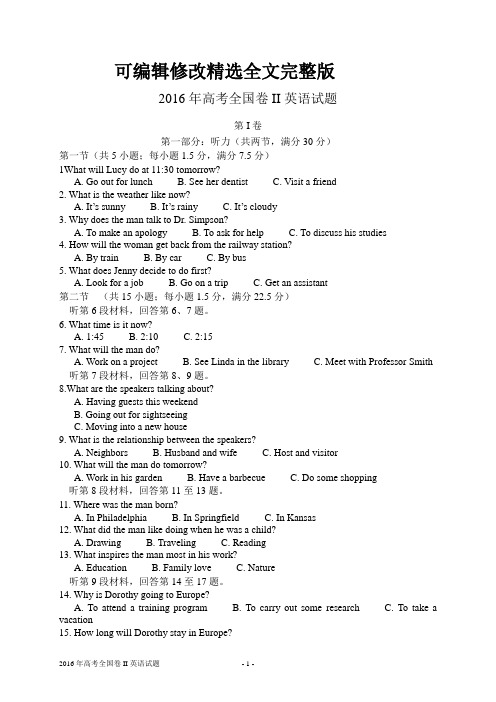
可编辑修改精选全文完整版2016年高考全国卷II英语试题第I卷第一部分:听力(共两节,满分30分)第一节(共5小题;每小题1.5分,满分7.5分)1What will Lucy do at 11:30 tomorrow?A. Go out for lunchB. See her dentistC. Visit a friend2. What is the weather like now?A. It’s sunnyB. It’s rainyC. It’s cloudy3. Why does the man talk to Dr. Simpson?A. To make an apologyB. To ask for helpC. To discuss his studies4. How will the woman get back from the railway station?A. By trainB. By carC. By bus5. What does Jenny decide to do first?A. Look for a jobB. Go on a tripC. Get an assistant第二节(共15小题;每小题1.5分,满分22.5分)听第6段材料,回答第6、7题。
6. What time is it now?A. 1:45B. 2:10C. 2:157. What will the man do?A. Work on a projectB. See Linda in the libraryC. Meet with Professor Smith 听第7段材料,回答第8、9题。
8.What are the speakers talking about?A. Having guests this weekendB. Going out for sightseeingC. Moving into a new house9. What is the relationship between the speakers?A. NeighborsB. Husband and wifeC. Host and visitor10. What will the man do tomorrow?A. Work in his gardenB. Have a barbecueC. Do some shopping听第8段材料,回答第11至13题。
- 1、下载文档前请自行甄别文档内容的完整性,平台不提供额外的编辑、内容补充、找答案等附加服务。
- 2、"仅部分预览"的文档,不可在线预览部分如存在完整性等问题,可反馈申请退款(可完整预览的文档不适用该条件!)。
- 3、如文档侵犯您的权益,请联系客服反馈,我们会尽快为您处理(人工客服工作时间:9:00-18:30)。
绝密★启用前6月8日15:00—16:402016年普通高等学校全国统一考试(新课标全国卷III)英语注意事项:本试卷分第I卷(选择题)和第II卷(非选择题)两部分。
考试结束后.将本试卷和答题卡一并交回。
第I卷注意事项:1.答第I卷前,考考生务必将自己的姓名、考生号填写在答题卡上。
2.选出每小题答案后,用铅笔把答题卡上对应的题目的答案标号涂黑。
如需改动,用橡皮擦干净后,在选涂其他答案标号。
不能答在本试卷,否则无效。
第一部分阅读理解(共两节,满分40分)第一节(共15小题;每小题2分,满分30分)阅读下列短文,从每题所给的四个选项(A、B、C和D)中,选出最佳选项,并在答题卡上将该项涂黑。
AOpera at Music Hall:1243 Elm Street. The season runs June through August,with additional performances in March and September.The Opera honors enjoy the Artsmembershipdiscounts. Phone:241-2742.Chamber Orchestra: The Orchestra plays at Memorial Hall at 1406 Elm Streer, which offers several concerts from March through June. Call 723-1182 for more information.SymphonyOrchestra: At Music Hall and Riverbend. For ticket sales, call 381-3300. Regular season runs September through May at Music Hall in summer at Riverbend.College Conservatory of Music (CCM):Performances are onthemain campus(校园)ofthe university, usually at Patricia Cobbett Theater. CCM organizes a variety of events, including performances by the well-known Lasalle Quartet, CCM’s Philharmonic Orchestra, andvatiousgroups of musicians presenting Baroque through modern music Students with I.D card can attend the events for free. A free schedule of events for each term is available by calling the box office at 556-4183. /events/calendar.Riverbend Music Theater: 6295 Kellogg Ave. Large outdoor theater with the closest seats under cover (piecedifference).Big name shows all summer long! Phone:232-6220.1·Whichnumber shouldyoucallifyouwanttosee opera?A 241-2742.B 723-1182.C 381-3300D 232-62202.When canyougotoaconcert byChamber Orches traA.February. B May. C August. D November.3.Wherecanstudent go for free preformances with their ID cards?A.MusicHall.B .Memorial Hall.C.Patricia Cobbett Theater.D.RiverbendMusicTheater4·How isRiverbend MusicTheaterdifferentfrom the other places?A.Ithas seatsintheopenair.B.Itgives shows allyear roundC.Itoffersmembership discounts.D.It presentsfamousmusicalworksBOn one of her trips to New York several years ago, Eudora Welty decided to take a couple of New York friends out to dinner. They settled in at a comfortable East Slide caféand within minutes, another customer was approaching their table.“Hey, aren’t you from Mississippi?” the elegant, white-haired writer remembered being asked by the stranger. “I’m from Mississippi too.”Without a second thought, the woman joined the Welty party. When her dinner partner showed up, she also pulled up a chair.“They began telling me all the news ofMississippi,” Welty said. “I didn’t know what my New York friends were thinking.”Taxis on a rainy New York night are rarer than sunshine. By the time the group got up to leave, it was pouring outside. Welty’s new friends immediately sent a waiter to find a cab. Heading back downtown toward her hotel, her big-city friends were amazed at the turn of events that had changed their Big Apple dinner into a Mississippi“My friends said: ‘Now we believe your stories,’” Welty added. And I said: ‘Now you know. These are the people that make me write them.’”Sitting on a soda in her room, Welty, a slim figure in a simple gray dress, looked pleased with this explanation.“I don’t make them up,” she said of the characters in her fiction these last 50 or so years. “I don’t have to.”Beauticians, bartenders, piano players and people with purple hats, Welty’s people come from afternoons spent visiting with old friends, from walks through the streets of her native Jackson, Miss., from conversations overheard on a bus. It annoys Welty that, at 78, her left ear has now given out. Sometimes, sitting on a bus or a train, she hears only a fragment(片段) of a particularly interesting story.5.What happened when Welty was with her friends at the cafe?A. Two strangersjoined her.B. Her childhood friends came inC. Aheavy rain ruined the dinner.D.Some people held apartythere.6 .The underlined word “them” in Paragraph 6 refers to Welty’s__A.readers B parties C.friendsD stories7. Whatcanwelearn aboutthecharactersinWelty’s fiction?A. Theylivein bigcitiesB.TheyaremostlywomenC. Theycomefrom reallifeD.Theyare pleasure seekersCIf you are a fruit grower —or would like to become one —take advantage of Apple Day to see what’s around. It’s called Apple Day but in practice it’s more like Apple Month. The day itself is on October 21, but since it has caught on, events now spread out over most of October around Britain.Visiting an apple event is a good chance to see, and often taste, a wide variety of apples. To people who are used to the limited choice of apples such as Golden Delicious and Royal Gala in supermarkets, it can be quite an eye opener to see the range of classical apples still in existence, such as Decio which was grown by the Romans. Although it doesn’t taste of anything special, it’s still worth a try, as is the knobbly(多疙瘩的) Cat’s Head which is more of a curiosity than anything else.There are also varieties developed to suit specific local conditions. One of the very best varieties for eating quality is Orleans Reinette, but you’ll need a warm, sheltered place with perfect soil to grow it, so it’s a pipe dream for most apple lovers who fall for it.At the events, you can meet expert growers and discuss which ones will best suit your conditions, and because these are family affairs, children are well catered for with apple-themed fun and games.Apple Days are being held at all sorts of places with an interest in fruit,including stately gardens and commercial orchards(果园).If you want to have a real orchard experience, try visiting the National Fruit Collection at Brogdale,near Faversham in Kent.8.What can people do attheapple events?A .Attend experts’lectures.B .Visit fruit-loving families.C .Plantfruit trees inan orchard.D. Tastemanykinds ofapples.9.What can welearnaboutDecio?A.Itisanew variety.B.It has a strangelook.C. Itisrarely seen now.D.Ithas a specialtaste.10. Whatdoesthe underlined phrase““a pipe dream””in Paragraph 3mean?A.Apracticalidea.B. A vain hope.C.A brilliant plan.D. A selfish desire.11.Whatisthe author’s p urpose inwritingthe text?A.To showhowto grow apples.B .Tointroduce an applefestival.C.Tohelppeople selectapples.D. Topromoteapple research.DBad news sells. If it bleeds, it leads. No news is good news, and good news is no news. Those are the classic rules for the evening broadcasts and the morning papers. But now that information is being spread and monitored(监控) in different ways, researchers are discovering new rules. By tracking people’s e-mails and online posts, scientists have found that good news can spread faster and farther than disasters and sob stories.“The ‘if it bleeds’ rule works for mass media,” says Jonah Berger, a scholar at the University of Pennsylvania. “They want your eyeballs and don’t care how you’re feeling. But when you share a story with your friends, you care a lot more how they react. You don’t want them to think of you as a Debbie Downer.” zxx.k Researchers analyzing word-of-mouth communication—e-mails,Web posts and reviews, face-to-face conversations—found that it tended to be more positive than negative(消极的), but that didn’t necessarily mean people preferred positive news. Was positive news shared more often simply because people experienced more good things than bad things? To test for that possibility, Dr. Berger looked at how people spread a particular set of news stories: thousands of articles on The New York Times’ website. He and a Penn colleague analyzed the “moste-mailed” list for six months. One of his first finds was that articles in the science section were much more likely to make the list than non-science articles. He found that science amazed Times’ readers and made them want to share this positive feeling with others.Readers also tended to share articles that were exciting or funny, or that inspired negative feelings like anger or anxiety, but not articles that left them merely sad. They needed to be aroused(激发) one way or the other, and they preferred good news to bad. The more positive an article, the more likely it was to be shared, as Dr. Berger explains in his new book, “Contagious: Why Things Catch On.” z.xxk12 .Whatdothe classic rulesmentionedinthetext apply to?A.News reports.B. Research papers.C .Private e-malls.D.Daily conversations.13. What canweinferaboutpeople like DebbieDowner?A.They’re sociallyinactive.B.They’re good at telling stories.C. They’re inconsiderate ofothers.D. They’re carefulwiththeirwords.14.Whichtendedtobethemost e-mailed accordingtoDr.Berger’s research?A .Sports new.B .Science articles.C.Personal accounts.D. Financial reviews.15 .What canbea suitable title forthetext?A.SadStoriesTravel FarWide.B .OnlineNewsAttractsMorePeople.C.ReadingHabitsChange withthe Times.D.GoodNewsBeatsBadon SocialNetworks.第二节(共5小题;每小题2分,满分10分)根据短文内容,从短文后的选项中选出能填入空白处的最佳选项。
